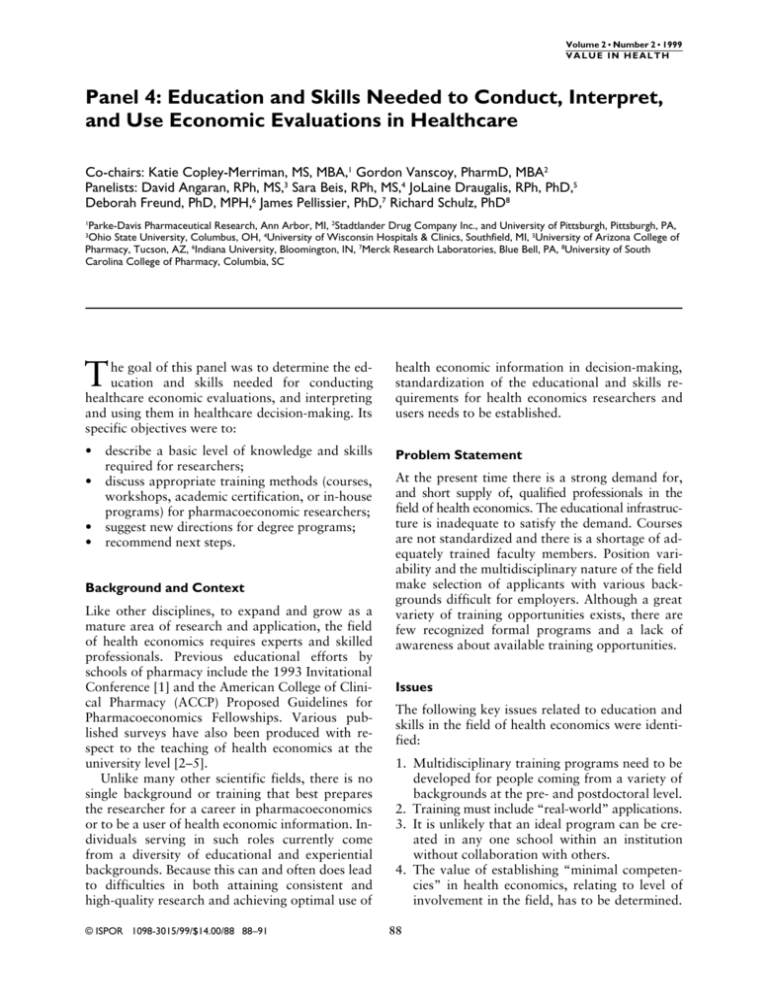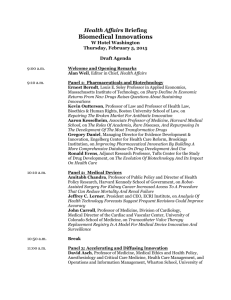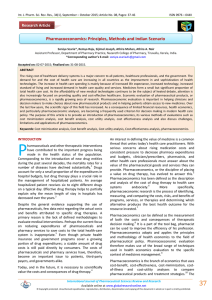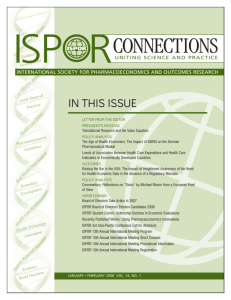Panel 4: Education and Skills Needed to Conduct, Interpret, and Use
advertisement

Volume 2 • Number 2 • 1999 VALUE IN HEALTH Panel 4: Education and Skills Needed to Conduct, Interpret, and Use Economic Evaluations in Healthcare Co-chairs: Katie Copley-Merriman, MS, MBA,1 Gordon Vanscoy, PharmD, MBA2 Panelists: David Angaran, RPh, MS,3 Sara Beis, RPh, MS,4 JoLaine Draugalis, RPh, PhD,5 Deborah Freund, PhD, MPH,6 James Pellissier, PhD,7 Richard Schulz, PhD8 1 Parke-Davis Pharmaceutical Research, Ann Arbor, MI, 2Stadtlander Drug Company Inc., and University of Pittsburgh, Pittsburgh, PA, Ohio State University, Columbus, OH, 4University of Wisconsin Hospitals & Clinics, Southfield, MI, 5University of Arizona College of Pharmacy, Tucson, AZ, 6Indiana University, Bloomington, IN, 7Merck Research Laboratories, Blue Bell, PA, 8University of South Carolina College of Pharmacy, Columbia, SC 3 T he goal of this panel was to determine the education and skills needed for conducting healthcare economic evaluations, and interpreting and using them in healthcare decision-making. Its specific objectives were to: health economic information in decision-making, standardization of the educational and skills requirements for health economics researchers and users needs to be established. • describe a basic level of knowledge and skills required for researchers; • discuss appropriate training methods (courses, workshops, academic certification, or in-house programs) for pharmacoeconomic researchers; • suggest new directions for degree programs; • recommend next steps. Problem Statement Background and Context Like other disciplines, to expand and grow as a mature area of research and application, the field of health economics requires experts and skilled professionals. Previous educational efforts by schools of pharmacy include the 1993 Invitational Conference [1] and the American College of Clinical Pharmacy (ACCP) Proposed Guidelines for Pharmacoeconomics Fellowships. Various published surveys have also been produced with respect to the teaching of health economics at the university level [2–5]. Unlike many other scientific fields, there is no single background or training that best prepares the researcher for a career in pharmacoeconomics or to be a user of health economic information. Individuals serving in such roles currently come from a diversity of educational and experiential backgrounds. Because this can and often does lead to difficulties in both attaining consistent and high-quality research and achieving optimal use of © ISPOR 1098-3015/99/$14.00/88 88–91 At the present time there is a strong demand for, and short supply of, qualified professionals in the field of health economics. The educational infrastructure is inadequate to satisfy the demand. Courses are not standardized and there is a shortage of adequately trained faculty members. Position variability and the multidisciplinary nature of the field make selection of applicants with various backgrounds difficult for employers. Although a great variety of training opportunities exists, there are few recognized formal programs and a lack of awareness about available training opportunities. Issues The following key issues related to education and skills in the field of health economics were identified: 1. Multidisciplinary training programs need to be developed for people coming from a variety of backgrounds at the pre- and postdoctoral level. 2. Training must include “real-world” applications. 3. It is unlikely that an ideal program can be created in any one school within an institution without collaboration with others. 4. The value of establishing “minimal competencies” in health economics, relating to level of involvement in the field, has to be determined. 88 89 Panel 4 Should these “minimal competencies” be defined? 5. Questions pertaining to who should be trained, how training should be performed, and what level of training is required need to be answered. 6. The necessity of credentialing practitioners and users of health economic research needs to be assessed. 7. There is need to improve the way information about training opportunities is disseminated. A number of training opportunities specifically related to economic evaluation in healthcare already exist, including self-study continuing education (CE) programs, sponsored workshops, and CE programs. Certificate programs are also available. For example, the American Society of Health System Pharmacists (ASHP) Competitive Edge Program includes self-study (30 hours), lecture, simulation exercises (4.5 days), and a research project (3–4 months). University-based certificate programs, graduate degrees, and minor concentrations exist in the field of health economics and health services research. Pharmacoeconomics fellowships are also available. Various types of Master’s degrees (MS, MBA, MPH), medical training (MD), and doctoral training (PharmD, PhD, DrPH) in a number of related also contribute significantly to the knowledge base for training in health economics disciplines (Table 1). Recommendations and Next Steps Recommendations are proposed in the following domains: • • • • • levels of expertise; educational infrastructure awareness; educational infrastructure enhancement; proper training “match”; balance between didactic and experiential education; Table 1 Examples of the many different academic disciplines contributing to expertise in health economics Accounting Business Economics Engineering Environmental forecasting Epidemiology Finance Health administration Health services research Management science Marketing Medicine Nursing Pharmacy Psychometrics Public health Sociology Statistics/Biostatistics • credentialing; • standardization of training and certification. Levels of Expertise Three levels of expertise among individuals involved in the practice and application of health economics were identified by the panel, including: (1) awareness, (2) application, and (3) conceptualization. A list of these different levels of expertise is shown in Table 2. Awareness is defined as an exposure to and factual knowledge of the discipline, allowing trained individuals to converse with others, understand research data and ask for help in the field. Individuals trained at the application level should be able to evaluate and compare data critically and make decisions based on health economic research information. In addition, they should have the ability to initiate studies based on standard methodologies. For the conceptualization level of expertise, trained individuals would have the ability to create new methodology, develop theory, and assimilate relevant methodologies and theories from related disciplines. Educational Infrastructure Awareness The panel recommends developing access to detailed information about available educational programs in the field of health economics. Identification of relevant educational resources outside of the field should be part of this awareness. A Web site would be an invaluable tool to disseminate information on availability of all existing training programs. Educational Infrastructure Enhancement Relevant educational resources outside of health economics should be utilized to enhance the educational infrastructure. With respect to health economics training, a Web site and other available communication technologies could be used to offer educational support; this may include question-answer potential on-line and distance learning. Sponsored formal training programs were also proposed. These would be competitively selected and targeted to different levels. The offering of higher level programs should be encouraged, as well as short courses at society meetings and 1- to 2-week training programs. To assure relevance for all stakeholders, a three-way partnership with managed care, industry, and academia needs to be established for fellowship and residency programs. There is also a need for official funding and consideration of fac- 90 Copley-Merriman and Vanscoy Table 2 Levels of competency and corresponding training needs in health economics Level of training Level of competency Awareness Industry field force Healthcare practitioners Healthcare administrators Clinical and marketing industry team Patient groups Benefits managers Application Decision-makers for populations Applied researcher Conceptualize Academic/faculty Senior industry scientists Senior research consultant Continuing education Experiential training/Certificate Fellowships Formal degree √ √ √ √ √ √ √ √ √ √ √ √ √ √ √ √ √ ulty incentives. Nationally known training sites and credible “train the trainer” programs would also contribute to the infrastructure. The International Society for Pharmacoeconomics and Outcomes Research (ISPOR) has a unique role to play in enhancing the educational infrastructure for health economics. Through ISPOR, various types of training could be offered, especially for those at higher levels. Faculty trainers should be recognized experts in the field. ISPOR may also wish to join forces with other organizations to expand programs. Proper Training “Match” Degree programs should accommodate multidisciplinary participants through the availability of prerequisite trainings and flexible core course offerings. Potential students of programs at the awareness training level should be made aware of program requirements. ISPOR identification of training programs would be helpful. Balance between Didactic and Experiential Education Programs, regardless of level, are enhanced by the incorporation of real-world data and exposure. The panel recommends that training include experience in a real-life setting, with case studies and “live” data sets. Establishment of collaborative relationships between academia, industry, and managed care organizations would be necessary to enable optimal training experiences. Credentialing of Individuals The development of a credentialing process should be a long-term goal of ISPOR to establish standards for the field. In the short term, for those already active in the field, the use of a professional portfolio demonstrating accomplishment in the field is recommended in lieu of credentialing. Standards of Training and Certification It is recommended that ISPOR play a leadership role in standardizing training and certification through a three-step process: • Step 1: Develop guidelines for postprofessional degree training. • Step 2: Accredit pharmacoeconomic residencies and fellowships. • Step 3: Establish collaborations with other organizations to expand accreditation to other relevant residencies. Summary At the present time there is a strong demand for, and short supply of, qualified professionals in the field of health economics. Although a diversity of training opportunities exists for both decisionmakers and researchers, the educational infrastructure is inadequate to satisfy the demand. Recognizing the need for different levels of expertise, the panel recommends an effort be made to increase awareness of currently available training opportunities and to strengthen the number and quality of these programs. Credentialing and standardization of training and certification are proposed as long-term goals in which the International Society for Pharmacoeconomics and Outcomes Research has a major role to play. References 1 Draugalis JR, Coons SJ. The role of colleges of pharmacy in meeting the pharmacoeconomic needs Panel 4 of the pharmaceutical industry: a conference report. Clin Ther 1994;16:523–37. 2 Draugalis JR. Updating skills: pharmacoeconomics as continuing education. Topics Hospital Pharmacy Manage 1994;13:72–6. 3 Frenkel M, Farber MD, Lepe I. Teaching health economics in American medical schools. J Med Prac Manage 1991;7:151–4. 4 Gregor KJ, Draugalis JR. Graduate pharmacoeconomic education and training programs in U.S. col- 91 leges of pharmacy. Am J of Pharmaceutical Education 1994;58(Winter):378–81. 5 Stergachis A, Gardner JS, Sullivan SD, Christensen DB. What are the training needs for developing research skills in pharmaceutical outcomes research? Paper presented at invitational conference, Patient Outcomes Interventions: A Scientific Foundation for the Future. American Pharmaceutical Association, November 1994.








